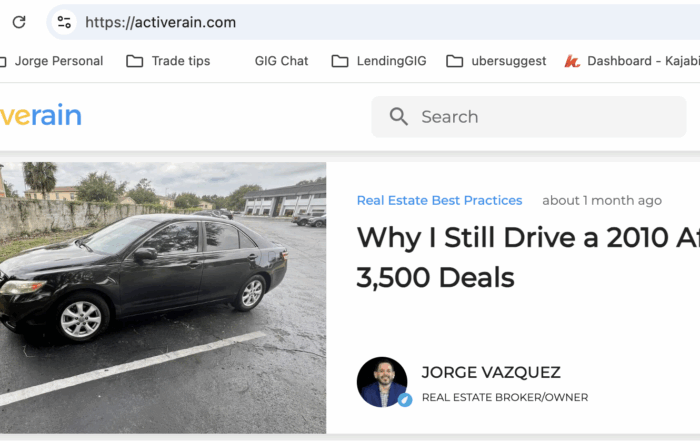
Why an LLC is Better Than a JV for Real Estate Investments: A Guide for Investors
Today we’re diving into a common question investors face when working together on a property: Should we form a joint venture (JV), or is it better to create an LLC? This question came up recently from one of our agents who had two investors ready to partner on a deal. Based on my experience—and conversations with CPAs—it’s clear: taxation and simplicity make LLCs the smarter choice in most cases. Here’s why.
Understanding the Basics
What Is a Joint Venture (JV)?
A JV is an agreement between two or more parties to work together on a specific project without forming a separate legal entity. Each party contributes resources and shares profits, but they remain individually liable.
What Is a Limited Liability Company (LLC)?
An LLC is a legal entity that provides liability protection for its owners (members) while allowing flexible management structures and tax options. The members create an operating agreement that outlines ownership percentages, roles, and how profits are shared.
The Problem with JVs: Taxation and Complexity
When two investors form a JV for real estate, it might seem simple at first—just a handshake deal or a written agreement to split profits. But this structure often creates tax headaches down the road. Here’s why:
-
Tax Reporting Chaos
- In a JV, each investor reports income, expenses, and losses on their individual tax returns. If one investor claims more expenses or reports less income, it can trigger IRS scrutiny.
- LLCs, on the other hand, file a single tax return, distributing profits and losses through K-1 forms to each member. This makes it clean and consistent.
-
No Liability Protection
- A JV doesn’t shield investors from liability. If one party defaults or gets sued, the other partner could be on the hook. LLCs provide a legal barrier, protecting personal assets.
-
Difficulty in Scaling
- JVs are often limited to one project. If the partnership wants to expand, a new agreement is needed. An LLC can hold multiple properties and scale with ease.
-
Unclear Roles and Disputes
- Without a detailed agreement, JVs can lead to disputes about roles, responsibilities, and profit-sharing. LLCs solve this with an operating agreement that defines everything upfront.
Why an LLC is the Better Option
Simplicity in Taxes
An LLC files its own tax return, and profits are passed through to members based on their ownership percentage. This eliminates confusion and reduces the chances of IRS audits.
Flexibility in Management
LLCs allow for a custom operating agreement, so you can outline exactly how the business is run, who makes decisions, and how profits are split.
Liability Protection
An LLC separates business assets from personal assets, reducing financial risk for both investors.
Scalability
With an LLC, you can add more properties, investors, or even different types of investments without creating new agreements for each venture.
Real-World Example
Let’s say two investors, Sarah and Mike, want to buy a rental property. Here’s how things could play out:
Scenario 1: Joint Venture
Sarah and Mike agree to split everything fifty-fifty. They each report their share of rental income and expenses on their personal tax returns. If Sarah claims a repair cost that Mike doesn’t, their tax returns don’t match, which could trigger an audit. Plus, if the property faces a lawsuit, both Sarah and Mike’s personal assets are at risk.
Scenario 2: LLC with Operating Agreement
Sarah and Mike form an LLC, contributing $100,000 each. Their operating agreement specifies a fifty-fifty split of profits and outlines responsibilities (e.g., Sarah handles leasing, Mike manages repairs). The LLC files its own tax return, and Sarah and Mike each receive a K-1 form for their personal filings. If the property faces legal trouble, their personal assets are protected.
How to Set Up an LLC for Real Estate Investments
-
Choose a State
- Most investors set up the LLC in the state where the property is located to avoid extra fees and taxes.
-
File Articles of Organization
- Submit this document to your state’s business division. It includes basic information like the LLC’s name and address.
-
Create an Operating Agreement
- This is the most important step. The agreement should cover:
- Ownership percentages
- Roles and responsibilities
- Profit and loss distribution
- Dispute resolution
- This is the most important step. The agreement should cover:
-
Obtain an EIN (Employer Identification Number)
- This is like a Social Security number for your LLC and is required for tax purposes.
-
Open a Business Bank Account
- Keep the LLC’s finances separate from personal finances to maintain liability protection.
Pros and Cons of an LLC
Pros
- Liability protection
- Simplified taxes
- Clear roles and responsibilities
- Scalability for future investments
Cons
- Initial setup costs
- Ongoing fees (state filing, annual reports)
- Requires detailed documentation
Closing Thoughts
Based on years of experience and advice from CPAs, I always recommend forming an LLC when two or more investors want to buy property together. It simplifies taxes, protects personal assets, and provides a clear framework for managing the business. JVs might work for one-off projects, but they can lead to bigger problems down the road.
If you’re an agent advising investors or an investor considering a partnership, make sure you consult a CPA and an attorney to structure your deal the right way. Trust me—taking the time to do it right now will save you a ton of headaches later.
Written by CEO of Graystone & companies & Coach of the Property Profit Academy
http://propertyprofitacademy.com
Keep it consistent, stay patient, stay true—if I did it, so can you! Ready to learn? Let me guide you at propertyprofitacademy.com – Jorge Vazquez, CEO of Graystone Investment Group & its subsidiary companies and Coach at Property Profit Academy.
OUR BEST ARTICLES
Why You Should Sell Your Deals with Us
Jorge Vazquez2025-08-02T03:43:24+00:00August 2nd, 2025|Comments Off on Why You Should Sell Your Deals with Us
Let’s keep it real—wholesaling ain’t easy. You lock up a deal, hustle to find a [...]
Landlords, Listen Up: Florida’s A+ Economy Is Coming—Here’s Why 2025 Still Makes Sense
Jorge Vazquez2025-08-01T19:53:23+00:00July 31st, 2025|Comments Off on Landlords, Listen Up: Florida’s A+ Economy Is Coming—Here’s Why 2025 Still Makes Sense
Florida’s A+ Economy in 2026: What This Means for Landlords, Renters, and Real Investors Like Me By Jorge Vazquez, [...]
What It Really Takes for Agents to Make Millions in Real Estate
Jorge Vazquez2025-08-01T01:32:51+00:00July 31st, 2025|Comments Off on What It Really Takes for Agents to Make Millions in Real Estate
What It Really Takes for Agents to Make Millions in Real Estate Inspired by a Fellow Featured Agent—Kat Palmiotti [...]
Jorge Vazquez Featured on ActiveRain for Real Estate Insight
Jorge Vazquez2025-08-01T19:20:27+00:00July 31st, 2025|Comments Off on Jorge Vazquez Featured on ActiveRain for Real Estate Insight
Graystone Investment Group CEO Jorge Vazquez Featured on ActiveRain for Insightful Real Estate Blog Post [...]
No Taxes and a 2.5% Rate—Is Florida Back on Top?
Jorge Vazquez2025-07-31T23:50:18+00:00July 28th, 2025|Comments Off on No Taxes and a 2.5% Rate—Is Florida Back on Top?
No Taxes and a 2.5% Rate—Is That Possible? Is Florida Back on Top? By Jorge Vazquez, [...]
What to Do When an HOA Won’t Let You Rent Because There’s “Too Many”
Jorge Vazquez2025-08-01T01:29:44+00:00July 28th, 2025|Comments Off on What to Do When an HOA Won’t Let You Rent Because There’s “Too Many”
What to Do When an HOA Won’t Let You Rent Because There’s “Too Many” Rentals By [...]
Meet our Team of Experts!
Meet Cody Bergstrom, Your Expert in Finding Deals
My team and I have over 20 years of experience in real estate. We have strong relationships with wholesalers, probate lawyers, sellers, and others in Florida. I aim to align your investments with your vision and deliver exceptional results. Contact Vanessa to schedule a meeting: https://graystoneig.com/cody
Meet Marylyn Patankar, Your Property Manager Partner
Hello, I’m Marylyn Patankar, the Field Manager and New Client Ambassador at Graystone Property Management. I educate investors about our perks, onboard new landlord investors, and manage on-site operations. Schedule a meeting with me here: https://graystoneig.com/marylyn

Meet Lisa Kaye Price, the LendingGig Top MLO
Lisa-Kaye Price – Real Estate Lending Specialist
With 20 years in real estate, Lisa-Kaye is dedicated to helping clients achieve their investment goals through strategic financing. She and her team focus on securing the best financing solutions to maximize leverage – a unique advantage of real estate investing.
Offering various options, including conventional loans, asset-backed and private money solutions, and programs for foreign nationals, Lisa’s expertise ensures clients get the support they need, whether buying new properties or refinancing.
Schedule a meeting with Lisa: https://graystoneig.com/lisa-kaye-price










